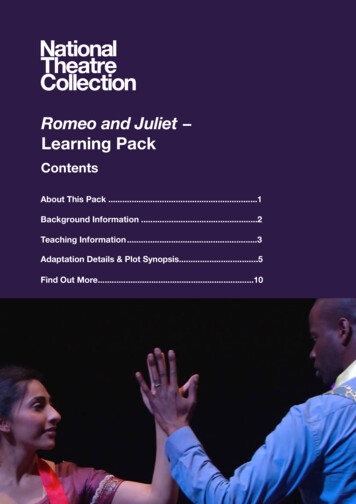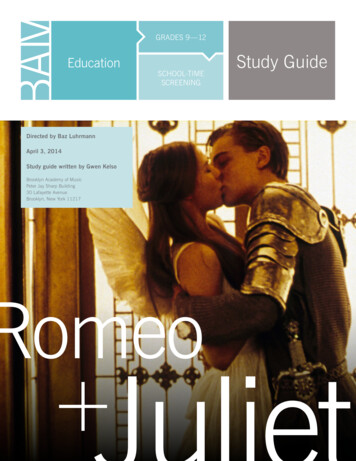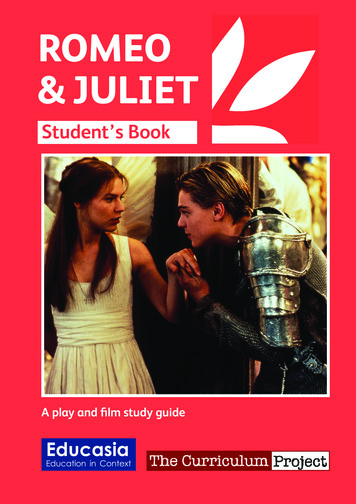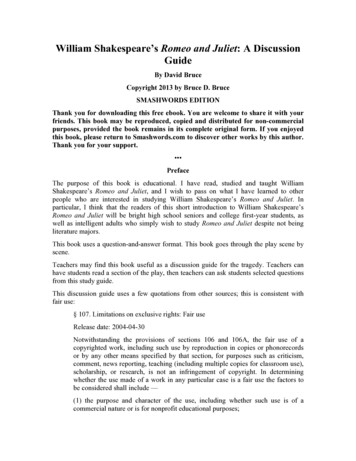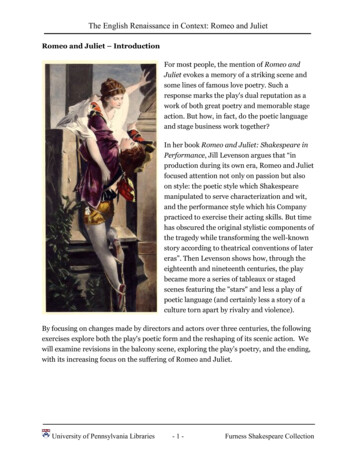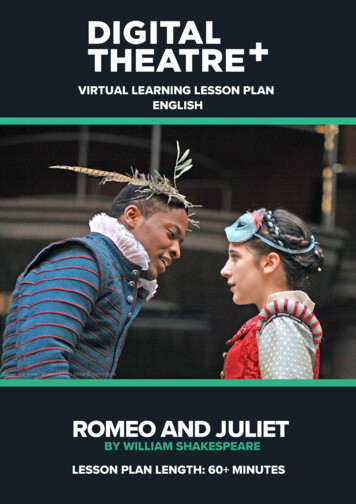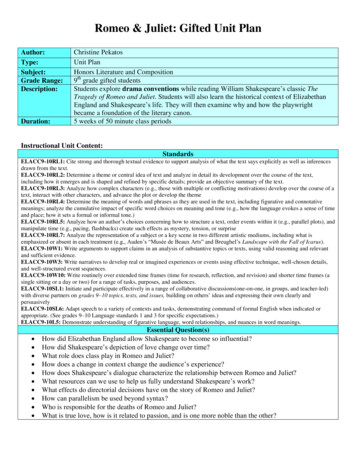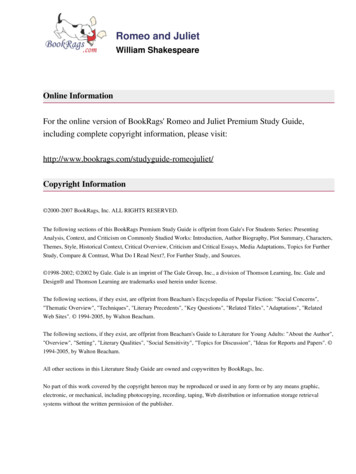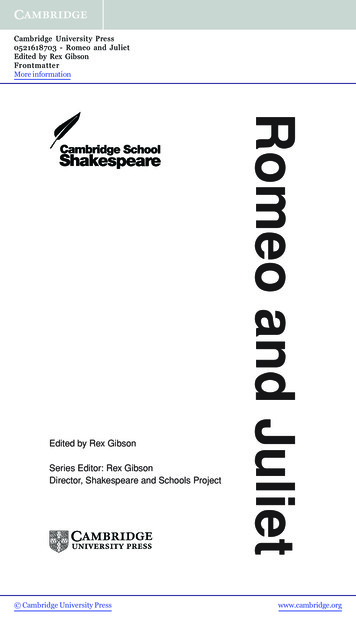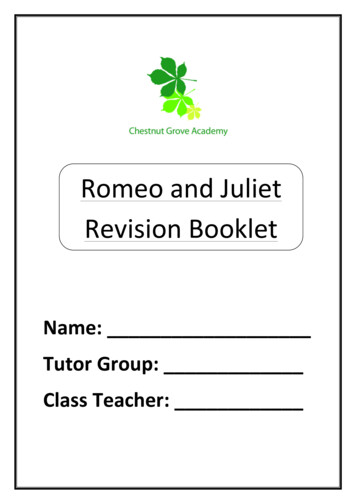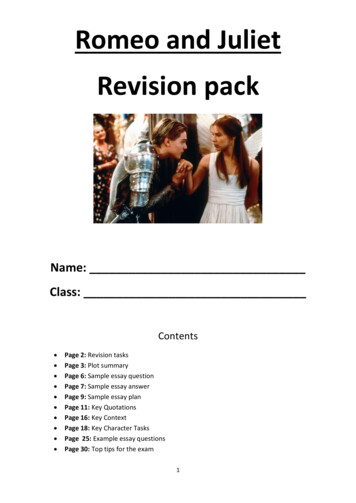
Transcription
Romeo and JulietRevision packName:Class:Contents Page 2: Revision tasksPage 3: Plot summaryPage 6: Sample essay questionPage 7: Sample essay answerPage 9: Sample essay planPage 11: Key QuotationsPage 16: Key ContextPage 18: Key Character TasksPage 25: Example essay questionsPage 30: Top tips for the exam1
Year 11 English revision guideThis revision plan will help you prepare for the Romeo and Juliet (same exam as Frankenstein)exam on Wednesday 13th May 2020.A good revision session is 20-30 minutes of focussed work, then give yourself a break of 10minutes, followed by another 20-30 minute revision session. Each activity on this sheet will take30 minutes.Aim to complete 2 activities per day.Remember: Find a quiet place to work Research proves music does not help you concentrate. Silence is best. Definitely don’thave the TV/radio on! Try and find a clock/timer to time 30 minutes. Ideally, don’t use your phone, as then youwill be tempted to check WhatsApp/IG/etc.Romeo and Juliet1Read over the ‘Key scenes from Romeo and Juliet ‘A3 sheet. Annotate eachquotation with who/what/when, language techniques, 3 layers of meaning.2Read over the ‘Key scenes from Romeo and Juliet ‘A3 sheet. Add contextnotes to as many quotes as possible. Use the context pages in your planner tohelp you.3From memory, brainstorm everything you can remember about the first 4 keyscenes from the ‘Key scenes from Romeo and Juliet ‘. Then get the sheet outand highlight everything you remembered correctly. Underline the details youforgot, and repeat them out loud 6 times each.4From memory, brainstorm everything you can remember about the last 4 keyscenes from the ‘‘Key scenes from Romeo and Juliet ‘. Then get the sheet outand highlight everything you remembered correctly. Underline the details youforgot, and repeat them out loud 6 times each.5Without looking at your notes, create an essay plan on each of the followingthemes in Romeo and Juliet: love, family, conflict. After you finish, checkyour notes/exercise book/A3 sheet and add more info improve your plan.6Without looking at your notes, create an essay plan on the following themes inRomeo and Juliet: fate, the role of women, time. After you finish, checkyour notes/exercise book/A3 sheet and add more info improve your plan.From memory, plan an essay on the theme of love. Then write the firstmegaparagraph of the essay (aim to PEE 2 quotes in 20 minutes). Check yourparagraph against the PEE success criteria in your exercise book.78From memory, write out the full ‘Key scenes from Romeo and Juliet ‘ sheet –how many quotations/key points can you remember? DON’T check your notesfirst – just see how much is in your long term memory. Then check the sheetagain, and add the details you missed.2
Plot SummaryIn the streets of Verona another brawl breaks out between the servants of the feuding noblefamilies of Capulet and Montague. Benvolio, a Montague, tries to stop the fighting, but is himselfembroiled when the rash Capulet, Tybalt, arrives on the scene. After citizens outraged by theconstant violence beat back the warring factions, Prince Escalus, the ruler of Verona, attemptsto prevent any further conflicts between the families by decreeing death for any individual whodisturbs the peace in the future.Romeo, the son of Montague, runs into his cousin Benvolio, who had earlier seen Romeo moping ina grove of sycamores. After some prodding by Benvolio, Romeo confides that he is in love withRosaline, a woman who does not return his affections. Benvolio counsels him to forget thiswoman and find another, more beautiful one, but Romeo remains despondent.Meanwhile, Paris, a kinsman of the Prince, seeks Juliet’s hand in marriage. Her father Capulet,though happy at the match, asks Paris to wait two years, since Juliet is not yet even fourteen.Capulet dispatches a servant with a list of people to invite to a masquerade and feast hetraditionally holds. He invites Paris to the feast, hoping that Paris will begin to win Juliet’sheart.Romeo and Benvolio, still discussing Rosaline, encounter the Capulet servant bearing the list ofinvitations. Benvolio suggests that they attend, since that will allow Romeo to compare hisbeloved to other beautiful women of Verona. Romeo agrees to go with Benvolio to the feast, butonly because Rosaline, whose name he reads on the list, will be there.In Capulet’s household, young Juliet talks with her mother, Lady Capulet, and her nurse aboutthe possibility of marrying Paris. Juliet has not yet considered marriage, but agrees to look atParis during the feast to see if she thinks she could fall in love with him.The feast begins. A melancholy Romeo follows Benvolio and their witty friend Mercutio toCapulet’s house. Once inside, Romeo sees Juliet from a distance and instantly falls in love withher; he forgets about Rosaline completely. As Romeo watches Juliet, entranced, a young Capulet,Tybalt, recognizes him, and is enraged that a Montague would sneak into a Capulet feast. Heprepares to attack, but Capulet holds him back. Soon, Romeo speaks to Juliet, and the twoexperience a profound attraction. They kiss, not even knowing each other’s names. When hefinds out from Juliet’s nurse that she is the daughter of Capulet—his family’s enemy—hebecomes distraught. When Juliet learns that the young man she has just kissed is the son ofMontague, she grows equally upset.As Mercutio and Benvolio leave the Capulet estate, Romeo leaps over the orchard wall into thegarden, unable to leave Juliet behind. From his hiding place, he sees Juliet in a window above theorchard and hears her speak his name. He calls out to her, and they exchange vows of love.Romeo hurries to see his friend and confessor Friar Lawrence, who, though shocked at thesudden turn of Romeo’s heart, agrees to marry the young lovers in secret since he sees in theirlove the possibility of ending the age-old feud between Capulet and Montague. The following day,Romeo and Juliet meet at Friar Lawrence’s cell and are married. The Nurse, who is privy to thesecret, procures a ladder, which Romeo will use to climb into Juliet’s window for their weddingnight.The next day, Benvolio and Mercutio encounter Tybalt—Juliet’s cousin—who, still enraged thatRomeo attended Capulet’s feast, has challenged Romeo to a duel. Romeo appears. Now Tybalt’s3
kinsman by marriage, Romeo begs the Capulet to hold off the duel until he understands whyRomeo does not want to fight. Disgusted with this plea for peace, Mercutio says that he willfight Tybalt himself. The two begin to duel. Romeo tries to stop them by leaping between thecombatants. Tybalt stabs Mercutio under Romeo’s arm, and Mercutio dies. Romeo, in a rage, killsTybalt. Romeo flees from the scene. Soon after, the Prince declares him forever banished fromVerona for his crime. Friar Lawrence arranges for Romeo to spend his wedding night with Julietbefore he has to leave for Mantua the following morning.In her room, Juliet awaits the arrival of her new husband. The Nurse enters, and, after someconfusion, tells Juliet that Romeo has killed Tybalt. Distraught, Juliet suddenly finds herselfmarried to a man who has killed her kinsman. But she resettles herself, and realizes that herduty belongs with her love: to Romeo.Romeo sneaks into Juliet’s room that night, and at last they consummate their marriage andtheir love. Morning comes, and the lovers bid farewell, unsure when they will see each otheragain. Juliet learns that her father, affected by the recent events, now intends for her tomarry Paris in just three days. Unsure of how to proceed—unable to reveal to her parents thatshe is married to Romeo, but unwilling to marry Paris now that she is Romeo’s wife—Juliet asksher nurse for advice. She counsels Juliet to proceed as if Romeo were dead and to marry Paris,who is a better match anyway. Disgusted with the Nurse’s disloyalty, Juliet disregards heradvice and hurries to Friar Lawrence. He concocts a plan to reunite Juliet with Romeo in Mantua.The night before her wedding to Paris, Juliet must drink a potion that will make her appear tobe dead. After she is laid to rest in the family’s crypt, the Friar and Romeo will secretlyretrieve her, and she will be free to live with Romeo, away from their parents’ feuding.Juliet returns home to discover the wedding has been moved ahead one day, and she is to bemarried tomorrow. That night, Juliet drinks the potion, and the Nurse discovers her, apparentlydead, the next morning. The Capulets grieve, and Juliet is entombed according to plan. But FriarLawrence’s message explaining the plan to Romeo never reaches Mantua. Its bearer, Friar John,gets confined to a quarantined house. Romeo hears only that Juliet is dead.Romeo learns only of Juliet’s death and decides to kill himself rather than live without her. Hebuys a vial of poison from a reluctant Apothecary, then speeds back to Verona to take his ownlife at Juliet’s tomb. Outside the Capulet crypt, Romeo comes upon Paris, who is scatteringflowers on Juliet’s grave. They fight, and Romeo kills Paris. He enters the tomb, sees Juliet’sinanimate body, drinks the poison, and dies by her side. Just then, Friar Lawrence enters andrealizes that Romeo has killed Paris and himself. At the same time, Juliet awakes. FriarLawrence hears the coming of the watch. When Juliet refuses to leave with him, he flees alone.Juliet sees her beloved Romeo and realizes he has killed himself with poison. She kisses hispoisoned lips, and when that does not kill her, buries his dagger in her chest, falling dead uponhis body.The watch arrives, followed closely by the Prince, the Capulets, and Montague. Montaguedeclares that Lady Montague has died of grief over Romeo’s exile. Seeing their children’sbodies, Capulet and Montague agree to end their long-standing feud and to raise gold statues oftheir children side-by-side in a newly peaceful Verona.4
Your Romeo and Juliet essay is marked for 5 different skills:AssessmentObjectiveHow would you showthis?AO1: have aninformed responseI can write clear topicsentences which give mypersonal answer to thequestionI can include quotes in“quotation marks” I can use phrases like‘could suggest’, ‘mightimply’ to describeeffectsI can identifytechniques correctly(e.g.metaphor, adjective,foreshadowing)I can describe the waylife in Shakespeare’sEngland is reflected inthe play AO1: Use textualreferences includingquotations tosupport your ideasAo2: Analyse thelanguage andstructureAo2: Use keyterminologyHow confidentare you aboutthis skill? AO3: show linksbetween Romeo andJuliet and thecontext it waswritten inAO4: Use a range of I can use synchronisedvocabulary andsentencespunctuationI can use semi-colons toaccuratelylink two full sentences I can check all mypunctuation and spellingis correct, includingcapital letters andapostrophes 5
William Shakespeare: Romeo and Juliet example questionRead the following extract from Act 1 Scene 3 of Romeo and Juliet and thenanswer the question that follows.At this point in the play Lady Capulet and the nurse are asking Juliet how shefeels about marriage to Paris.LADY CAPULETTell me, daughter Juliet,How stands your disposition to be married?JULIETIt is an honour that I dream not of.NurseAn honour! were not I thine only nurse,I would say thou hadst suck'd wisdom from thy teat.LADY CAPULETWell, think of marriage now; younger than you,Here in Verona, ladies of esteem,Are made already mothers: by my count,I was your mother much upon these yearsThat you are now a maid. Thus then in brief:The valiant Paris seeks you for his love.NurseA man, young lady! lady, such a manAs all the world--why, he's a man of wax.LADY CAPULETVerona's summer hath not such a flower.NurseNay, he's a flower; in faith, a very flower.LADY CAPULETWhat say you? can you love the gentleman?This night you shall behold him at our feast;Read o'er the volume of young Paris' face,And find delight writ there with beauty's pen;;So shall you share all that he doth possess,By having him, making yourself no less.NurseNo less! nay, bigger; women grow by men.LADY CAPULETSpeak briefly, can you like of Paris' love?JULIETI'll look to like, if looking liking move:But no more deep will I endart mine eyeThan your consent gives strength to make it fly.Starting with this conversation, explain how far you think Shakespearepresents Juliet as innocent and naive.Write about: how Shakespeare presents Juliet in this extract how Shakespeare presents Juliet in the play as a whole.[30 marks]AO4 [4 marks]Starting with the extract, explain how far you think Shakespeare presents Juliet as innocent andnaive. Write about How Shakespeare presents Juliet in this extractHow Shakespeare presents Juliet in the play as a whole6
Model AnswerAt the start of the play, Shakespeare established Juliet as innocent and naive through herreaction to the proposed marriage to Paris. When Juliet says marriage is ‘an honour that Idream not of’, Shakespeare’s use of the negative verb ‘dream not’ suggests that she is stilla young girl who hasn’t started to think about marriage. It could also suggest that she isunusually naive because in Elizabethan times girls of Juliet’s age were often married, andso it would be surprising to an Elizabethan audience that she has ‘not’ even thought aboutmarriage. However, Juliet does show some awareness when she says that marriage is an‘honour’; Shakespeare’s use of the loaded noun could suggest that Juliet is aware that agood marriage is important for women in a time when the role of rich girls was to marrywell to bring their family ‘honour’.Shakespeare develops the presentation of Juliet’s innocent attitude to marriage further.When Lady Capulet tells Juliet ‘younger than you are made already mothers’,Shakespeare’s use of comparison implies that Juliet is unusually innocent in that she hasyet to marry despite this being common practice at the time for girls her age.Shakespeare’s use of the symbolic noun ‘mothers’ could imply that Juliet is sexuallyinnocent, as other girls her age are sexually active and are having children. Thiscomparison could also suggest that Lady Capulet is implicitly criticising Juliet’sinnocence and lack of thought about marries, as she subtly implies that if ‘younger’women have already done their duty (by the standards of the time) to ‘grow’ or becomepregnant and have children to carry on the family name, Juliet should have done thesame.Shakespeare develops the presentation of Juliet as innocent in the way in which othercharacters in the scene relate to her. Juliet does not say much in this scene while the nurseand Lady Capulet, who are more experienced, dominate the scene and give her lots ofadvice, further emphasising Juliet’s innocence in the area of marriage and relationships incomparison to these older women. When the nurse says Paris is ‘a man of wax’,Shakespeare’s use of metaphor could suggest that the other characters see Juliet asinnocent in her approach to life, as they are trying to encourage her to like Paris throughphysical descriptions of his beauty. The metaphor ‘wax’ could imply Paris has beensculpted like a work of art, and so is perfect in every way. It also could suggest that Parisis honourable, as ‘wax’ seals were used in Elizabethan England to sign contracts andmake them legal; the nurse implies Juliet is naive enough to be persuaded to marry Parisjust based on his looks and reputation for honour.However, Juliet later reveals herself to be a less naive character as she instantly realises herpossible error in falling in love with a man she does not know, showing a goodunderstanding of the difficulty of independently establishing a happy relationship forElizabethan women. When Juliet wonders who her new lover is, she exclaims that if he ismarried ‘my grave is like to be my wedding bed’. Shakespeare’s use of foreshadowing herecould suggest that Juliet instantly evaluates her relationship and is able to predict alikely tragic outcome. Furthermore, the symbolic noun ‘wedding bed’ could suggest a loss7
of innocence as Juliet instantly thinks of her relationship in sexual terms; in Elizabethantimes, a girl would first have sex on her wedding night, so the ‘wedding bed’ symbolisesJuliet’s loss of sexual innocence.This presentation of Juliet is continued as Shakespeare shows Juliet demanding anhonourable treatment from Romeo, protecting herself as a woman with few rights in apatriarchal society. When Romeo and Juliet first declare their love for each other, Julietinsists that she will only see Romeo again if his ‘bent of love be honourable, thy purposemarriage’. Shakespeare’s use of the symbolic adjective ‘honourable’ suggests that Juliet isaware that she must maintain her reputation for virtue and honour. This was especiallyimportant in the patriarchal society of the Elizabethan times, in which women were judgedon their reputation and chastity. The only way for her to maintain her virtue is‘marriage’, so Shakespeare’s use of the questioning verb ‘purpose’ could imply that Juliet iswise enough to test Romeo to ensure that he values her enough to protect her reputationthrough marriage.In the final scenes of the play, Shakespeare portrays Juliet as decisive and strong whenshe takes her own life. When Juliet realises she will be found with Romeo, she kills herself,crying ‘O happy dagger’. Shakespeare’s use of personification of the dagger as ‘happy’could suggest that she sees death as the only positive way to resolve this situation. InElizabethan times, suicide was a mortal sin, illegal and also seen as sending you to hell;suicide victims could not be buried on church land. As a result, Shakespeare uses Juliet’sreaction to the ‘dagger’ as ‘happy’ to possibly imply that she is brave and decisive enoughto welcome these consequences rather than live without Romeo. However, it could alsoimply that she is innocent and naive because she does not think about these consequences;Shakespeare’s use of a short exclamation implies Juliet acts quickly and withoutthinking, possibly innocently damning her soul forever.8
Example question with essay planRead the following extract from Act 3 Scene 1 of Romeo and Juliet and thenanswer the question that follows.At this point in the play Tybalt has just killed Mercutio in a duel. Benvolio has justtold Romeo that Mercutio is dead.ROMEOThis day's black fate on more days doth depend;This but begins the woe, others must end.BENVOLIOHere comes the furious Tybalt back again.ROMEOAlive, in triumph! and Mercutio slain!Away to heaven, respective lenity,And fire-eyed fury be my conduct now!Imperative verb ‘must’suggests fighting isinevitable. ‘Go with him’suggests revenge as amotive for conflict.! Which quotes wouldyou pick? Highlight andannotate two morequotes which you coulduse to answer thequestionRe-enter TYBALTThe alliteration “fireeyed fury” suggestsviolence and rage haveovertaken Romeo’speaceful ‘lenient’ natureearlier in the play. ‘Fire’– allusion to hell?Conflict seenimmoral/evil? Romeorejects peace.Now, Tybalt, take the villain back again,That late thou gavest me; for Mercutio's soulIs but a little way above our heads,Staying for thine to keep him company:Either thou, or I, or both, must go with him.TYBALTThou, wretched boy, that didst consort him here,Shalt with him hence.ROMEOThis shall determine that.They fight; TYBALT fallsBENVOLIORomeo, away, be gone!The citizens are up, and Tybalt slain.Stand not amazed: the prince will doom thee death,If thou art taken: hence, be gone, away!ROMEOO, I am fortune's fool!Metaphor “fortune’sfool” suggests conflictand death inevitableand inescapable.CONTEXT: Elizabethanbelief in Fate/Fortuna.Starting with this conversation, explain how far you think Shakespearepresents conflict in the play.The boxes above show the essayplan for the ‘extract’. Look on theWrite about:next page for a plan referring to how Shakespeare presents conflict in this extractthe ‘play as a whole’ how Shakespeare presents conflict in the play as a whole.[30 marks]AO4 [4 marks]9
Sampson: “I will bite my thumb athim” – symbolic gesture. Conflictphysical between the two families –also conflict between young men,deliberately provoking each other tofight. Defending honour. CONTEXT:Elizabethan society more violentthan today – more fighting especiallybetween young men/rivalapprentices.The prologue: “star crossedlovers” – symbolism hints atconflict being inescapable fromthe start. CONTEXT:Elizabethan belief in fate anddestinyHowShakespearepresents conflictin the play as awhole.]Lord Capulet: ‘Hang, starve,beg, die in the streets’ – list ofcruel verbs suggests his ragewhen Juliet won’t marry Paris.Conflict within the family.CONTEXT: patriarchal society inElizabethan times/daughter’sexpected to obey fathers.HowShakespearepresents conflictin the play as awhole.].Now you have a go. Imagine you got thisquestion. Choose 3 different momentsfrom the play about conflict and completethe planning mindmap.10
Key Quotations RevisionIn the exam, you will gain marks for referring to specific moments from the text. Youwill gain even more marks if you can remember key quotations.The quotations below are key quotations which you should be able to use in anyessay.P: who isspeaking? Who to?What about?When in the play?E: quotation/evidenceE: analysis. Identifytechniques. 2 or 3 layersof meaning“two households, bothalike in dignity”“a pair of starcrossed lovers”“I will bite my thumbat them”“o brawling love, oloving hate”“my child is yet astranger in the world”“he’s a man of wax”“women grow by men”“my mind misgivesSome consequence yethanging in the stars”“my lips, two blushingpilgrims, stand”“you kiss by the book”11Link to historicalcontext
“it is the east, andJuliet is the sun”“so shows a snowydove trooping withcrows”: “like a rich jewel inan Ethiope’s ear”“speak again brightangel”“prince of cats”“A plague o' both yourhouses!”“fire-eyed fury be myconduct now!”“with my child my joysare buried.”“if he be married, mygrave is like to be mywedding bed”“It is too rash, toounadvised, too sudden;Too like the lightning”“Wisely and slow; theystumble that run fast.“These violentdelights have violentends”12
“O happy dagger”“The sun, for sorrow,will not show his head”never was a story ofmore woeThan this of Julietand her Romeo13
Highlight these key quotes from ‘Romeo and Juliet’ to make essay plan – 8 Key Scenes1) THE PROLOGUE and fate“Two households, both alike indignity” (1)“Ancient grudge” (3)“A pair of star-crossed lovers” (6)“Death mark’d love’ (9)3) Act 1, Scene 2 - Paris and Capulet andsetting the scene for Juliet’s marriage toParisLord Capulet: “My child is yet a stranger in the world”(1.2.8)Paris: “Younger than she are happy mothers made”(1.2.12)Lord Capulet: “My will to her consent is but a part”(1.2.17)2) Act 1, Scene 1 the fight and settingthe scene for violenceSampson: “I will bite my thumb at them” (1.1.37)Sampson: “Draw, if you be men” (1.1.56)Benvolio: “Put up your swords, you know not what youdo” (1.1.59)Tybalt: ‘Heartless hinds’ (1.1.60)Tybalt: “Drawn, and talk of peace! I hate the word”(1.1.64)Prince: “Rebellious subjects If ever you disturb ourstreets again, Your lives shall pay the forfeit of thepeace.” (1.1.91)4) Act 1, Scene 4/5 - Capulet Ball – Love at first sightand forgetting RosalineBenvolio [about Romeo]: “Makes himself an artificial night” (1.1.130)Romeo [about Rosaline]: “She is rich in beauty” (1.1.209)Romeo: “Oh, she doth teach the torches to burn bright!” (1.5.42)Romeo: “As a rich jewel in an Ethiope’s ear” (1.5.45)Romeo: “So shows a snowy dove trooping with crows” (1.5. 46)Juliet: “You kiss by the book” (1.5.109)Juliet: “If he be married, my grave is like to be my wedding bed”(1.5.135)Juliet: “My14 only love sprung from my only hate!” (1.5.138)
6) Act 3, Scene 1 - Mercutio dies and Romeo takes revenge5) Act 2, Scene 2/3 - Capulet's orchard andagreeing to marryRomeo: “Juliet is the sun” (2.2.3)Romeo: “bright angel” (2.2.26)Juliet: “It is too rash, too unadvised, too sudden; Toolike the lightning.” (2.2.118)Juliet: “This bud of love may prove a beauteousflower” (2.2.121)Friar Lawrence: “These violent delights have violentends” (2.6.9)Friar Lawrence: “For this alliance may so happy proveTo turn your households' rancor to pure love.” (2.3.91)Friar Lawrence: “wisely and slow; they stumble that runfast” (2.3.94)7) Act 3, Scene 5 – Juliet’s relationship withher parents and the nurseLord Capulet: ’you green-sickness carrion!’ (3.5.156)Lord Capulet: “Hang thee, young baggage get thee tochurch a’ Thursday or never after look me in the face speak not, reply not, my fingers itch.” (3.5.160)Lord Capulet: ‘Hang, beg, starve, die in the streets’(3.5.192)Nurse (about Paris and Romeo): ‘Romeo’s a dishcloutto him’. (3.5.195)Tybalt: “Thou art a villain.” (3.1.58)Mercutio: “Calm, dishonourable, vile submission” (3.1.70)Mercutio: “Tybalt, you rat catcher.” (3.1.72)Mercutio: “A plague o’ both your houses” (3.1.87 & 95 & 102)Mercutio: “Ask for me tomorrow and you shall find me a grave man.” (3.1.94)Romeo: “Thy beauty hath made me effeminate And in my temper soften'dvalour's steel!” (3.1.110)Romeo: “Fire-eyed fury be my conduct now!” (3.1.120)Romeo: “I am fortune’s fool.” (3.1.132)Lady Capulet: “Romeo slew Tybalt. Romeo must not live.” (3.1.177)8) Act 5 – The End and fateRomeo: “I defy you, stars!” (5.1.24)Apothecary: “Drink it off and if you had the strength of twenty men, it would dispatch youstraight.” (5.2.78)Friar Lawrence: “Unhappy fortune!”Romeo [to Paris]: “Tempt not a desperate man Put not another sin upon my head, Byurging me to fury: O, be gone!” (5.3.62)Romeo: “In thy cheeks, And death's pale flag is not advanced.” (5.3.17)Romeo [to Tybalt]: “Forgive me, cousin!”Romeo: “I still will stay with thee; And never from this palace of dim night Depart again”Romeo: “Arms, take your last embrace! and, lips, O you The doors of breath, seal with arighteous kiss”Juliet: “drunk all, and left no friendly drop To help me after?”Juliet: “O happy dagger” (5.3.182)Prince: “See what a scourge is laid upon your hate / That heaven finds means to killyour joys with love” (5.3.309)Lord Montague: “But I can give thee more: I will raise her statue in pure gold”Prince: “The sun, for sorrow, will not show his head” (5.3.322)Prince: “Go hence, to have more talk of these sad things” (5.3.323)Prince: “For never was a story of more woe/Than this of Juliet and her Romeo.”15(5.3.325)
Highlight these contextual references and add them to your plansQ – What is context?A – Context is the background to the play. Context is fact. It is what would have influenced Shakespearewhen he wrote Romeo and Juliet. You could argue that Romeo and Juliet is a reflection of Elizabethansociety/life in the 1600s/the seventeenth centuryQ – How many references do I need to use?A – At least two. Ideally, you would end each paragraph with context.Q – How do I add context?A - Use phrases like ‘This could have reflected ’ ‘Perhaps Shakespeare was inspired by ’ ‘This may linkto ’ ‘This may represent the arrogance/selfishness of people like ’ ‘Perhaps this could mirrorQ – Are there different types of context?A – Yes, it is not just biographical. Context has been sub divided into different categories. Try to use amixture of the different types.Biographical context (context about the life of Shakespeare.1. Shakespeare was born in Stratford in 1564 into a fairly rich family. He therefore was educated andcould read and write2. He wrote Romeo and Juliet around 1600.Historical context1. As Queen Elizabeth was the queen at the time, this means it was the Elizabethan era.Social context1. Rich families would often have nurses (nursery nurse – rather than medical nurse) and servants.Nurses would often have very close bonds with the children as they had often raised themsinglehandedly since birth and spent many hours with them. A ‘wet nurse’ is where the nurse wouldbreast feed the baby, even though they were not related. This would also increase the bond betweenthe nurse and the child. Rich women often had a very busy social lives and some wouldn’t be veryclose to their children.2. ‘Courtly love’ was a special kind of love in the Elizabethan court. It was a way of expressing the lovewhat rich Elizabethans might have been denied in their arranged marriages. A man would fix on anoble woman to be ‘in love’ with. He would write poems and songs about her beauty and goodness.This would not necessarily lead to an affair (though it might have done) instead, the man might takepleasure in the misery he experienced being in love with an unattainable woman. Romeo’s love forRosaline therefore seems to be more ‘courtly love’ than real love – he loves her from afar, feels miseryat the lack of hope for his love, praises her beauty and purity. This is a contrast to the later passionof his love for Juliet – possibly suggesting that his love for Rosaline is more staged than real.3. England was a religious country in 1600. Every single child would be baptised. Suicide would havebeen seen as immoral. However, some audiences would see the fact that Romeo and Juliet areprepared to die for each other as romantic. Others would see it as restoring the natural order afterthey gone against their parents.4. Many people would attend the theatre. The poor would stand for the whole play. They could be drunkand rowdy. As the audience would be noisy and there was no electricity, important lines may berepeated.16
Patriarchy1. Elizabethan society was a patriarchal society. This meant it was ruled by men, who held all the legaland financial power.2. Men were considered to be the leaders and women their inferiors. Women were regarded as "theweaker sex", not just in terms of physical strength, but emotionally too.3. Women were the property of men. It was believed that women always needed someone to look afterthem. If they were married, their husband was expected to look after them. If they were single, thentheir father, brother
Romeo and Juliet 1 Read over the 'Key scenes from Romeo and Juliet 'A3 sheet. Annotate each quotation with who/what/when, language techniques, 3 layers of meaning. 2 Read over the 'Key scenes from Romeo and Juliet 'A3 sheet. Add context notes to as many quotes as possible. Use the context pages in your planner to help you.
